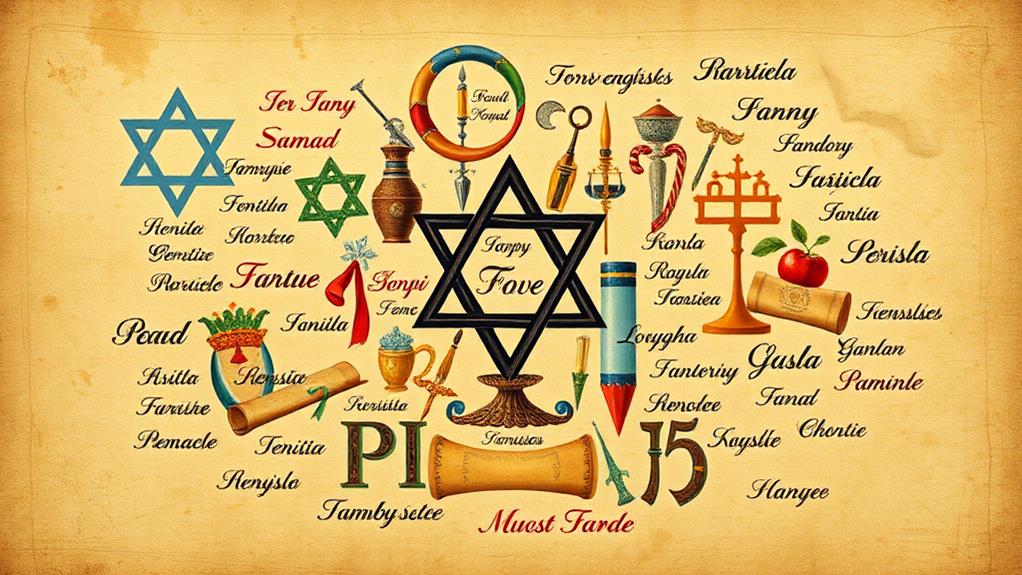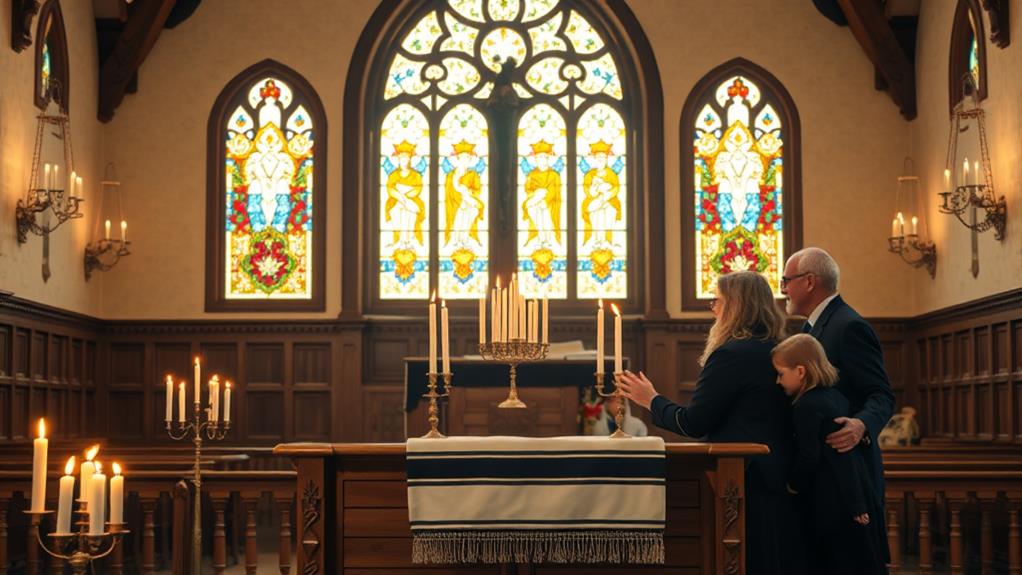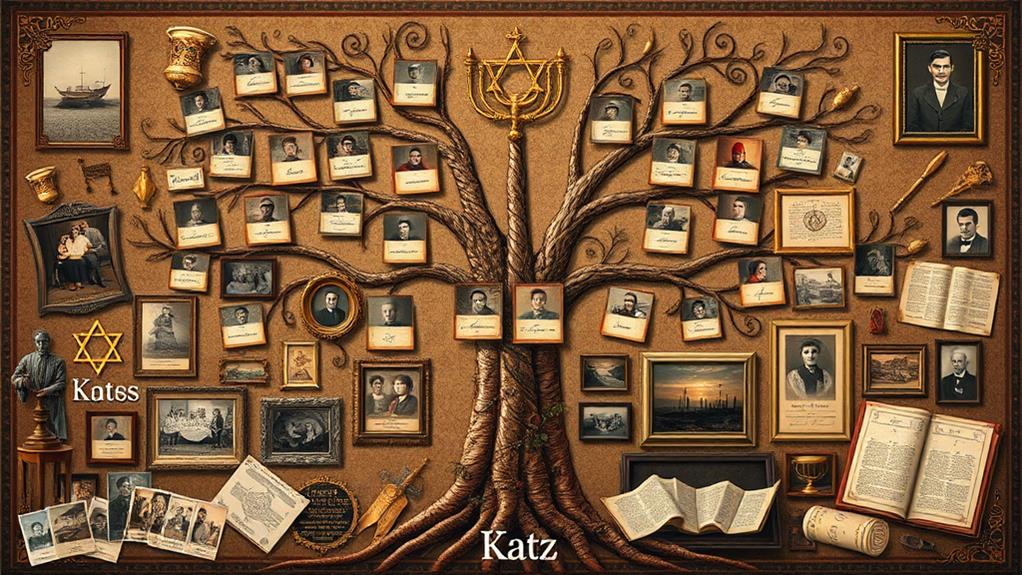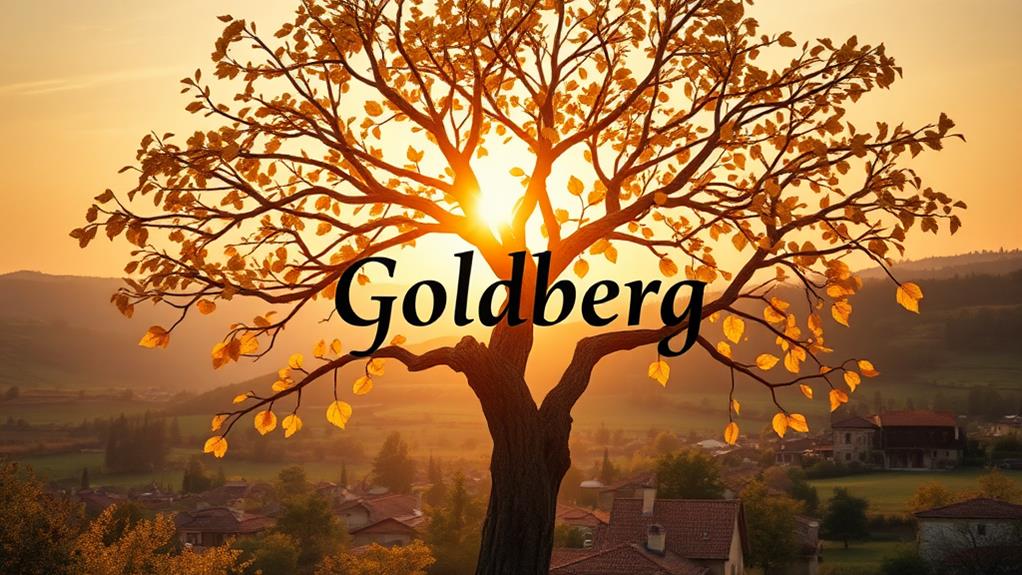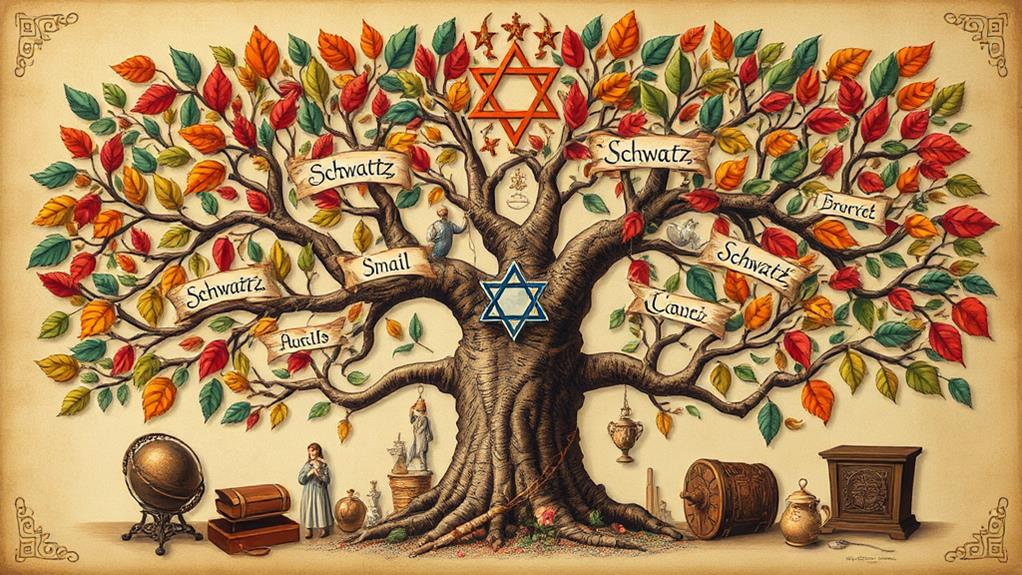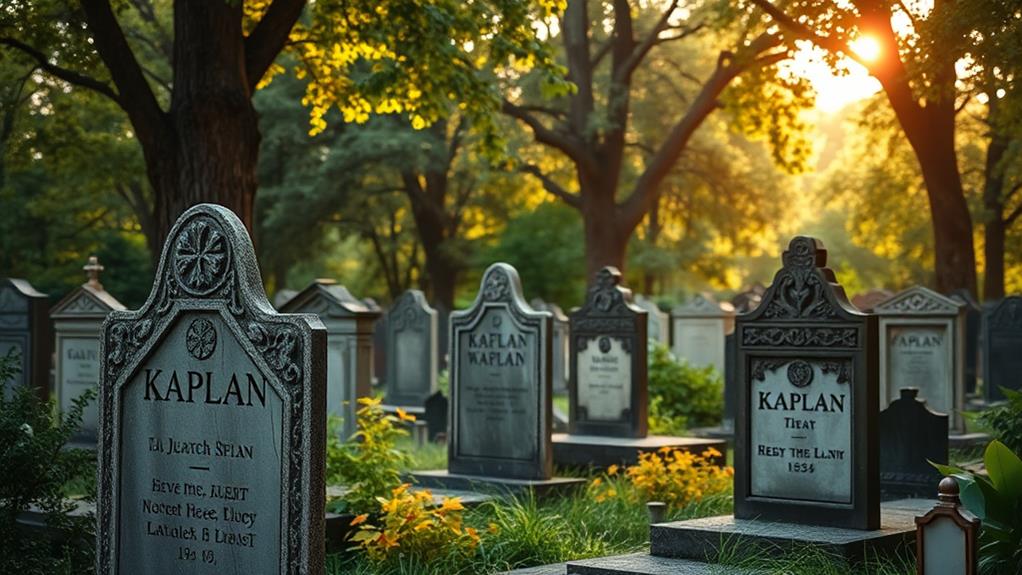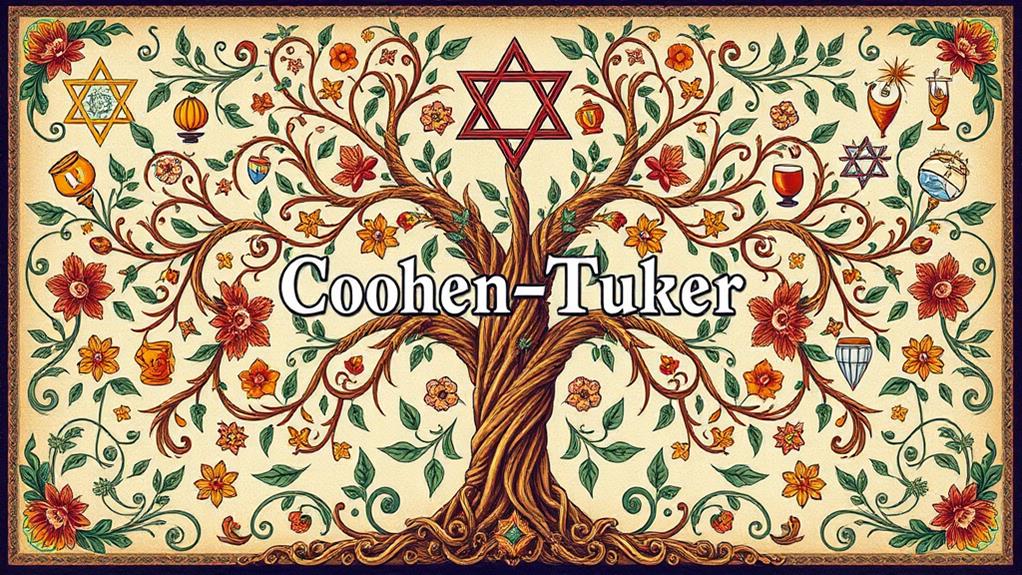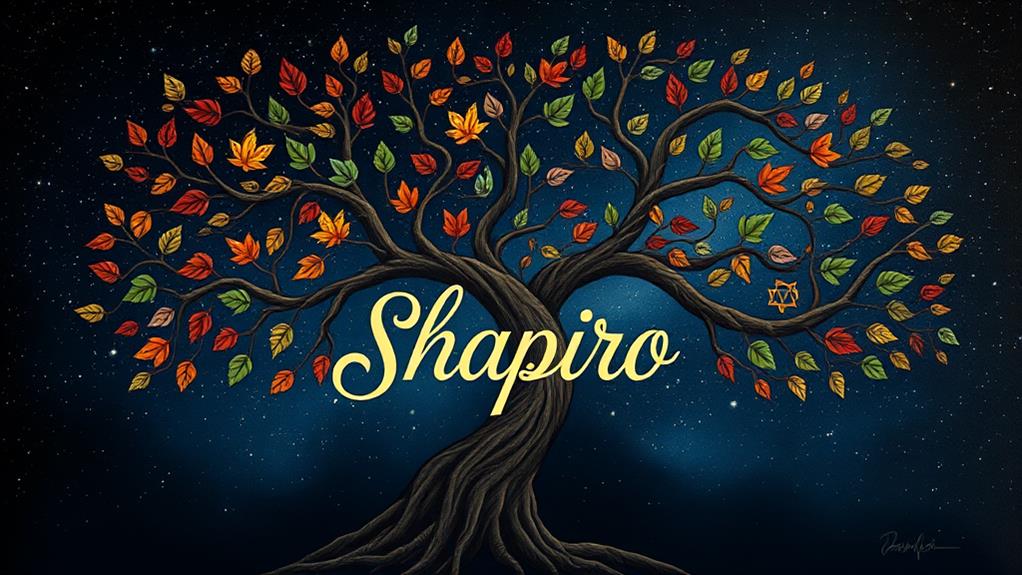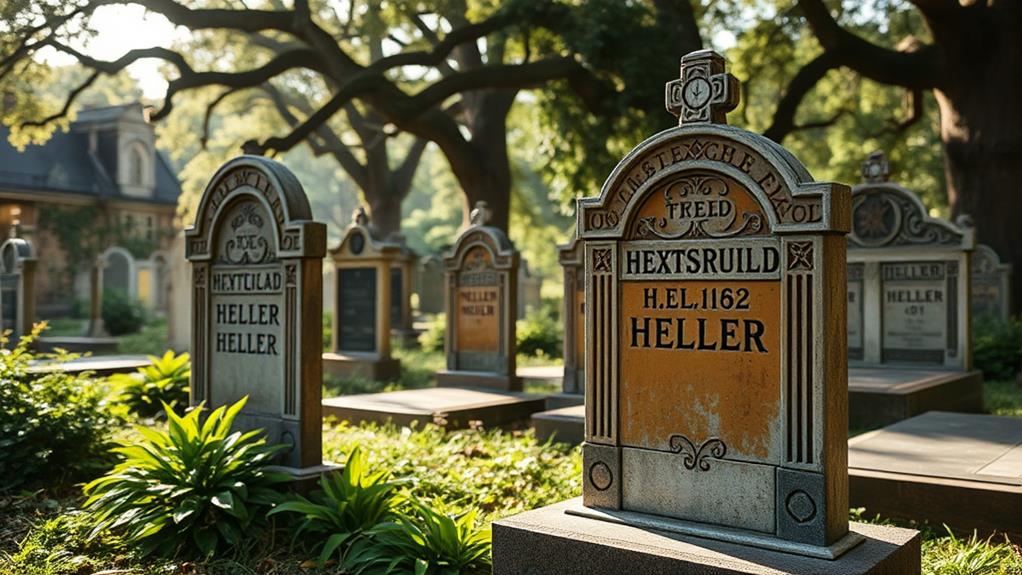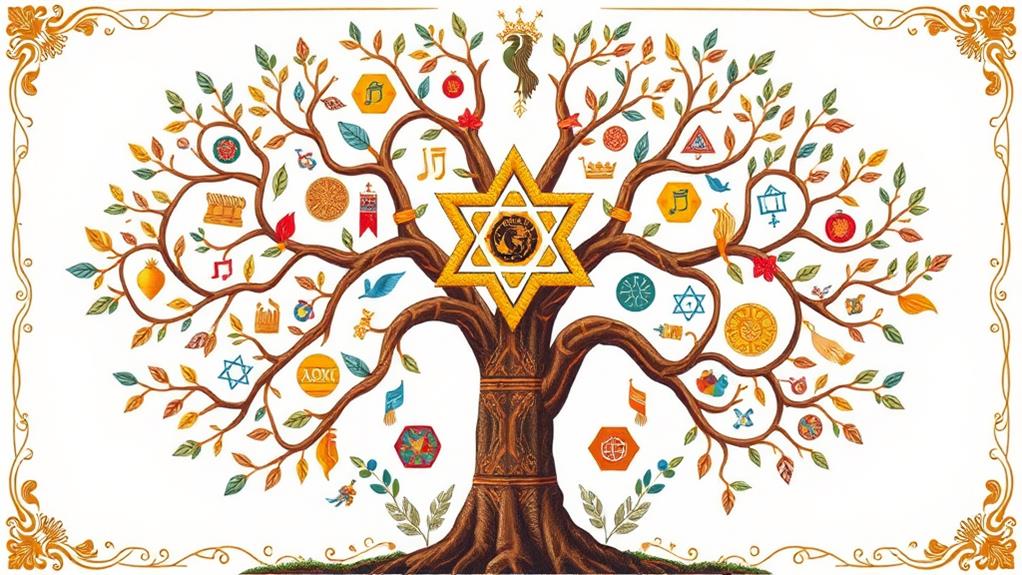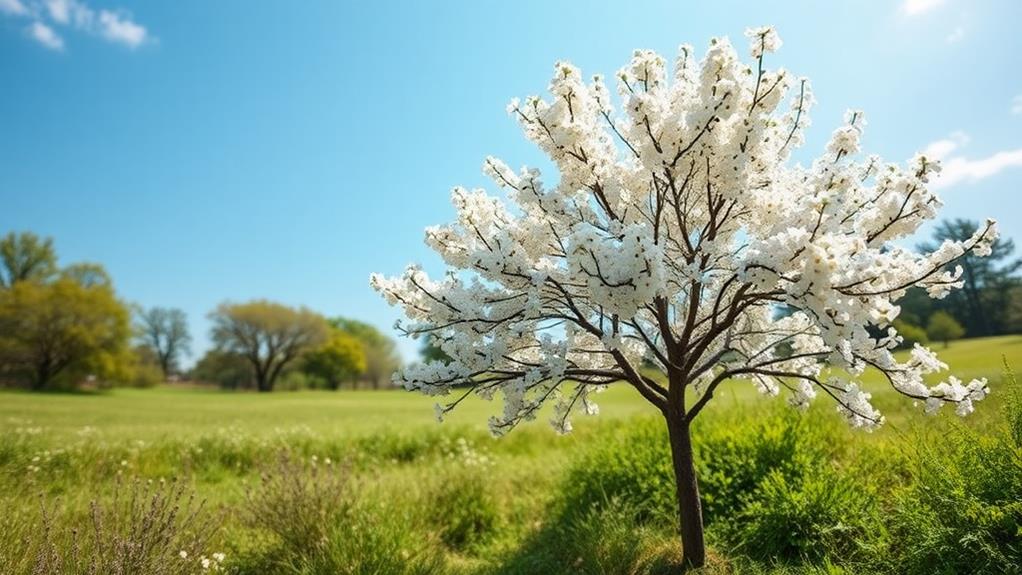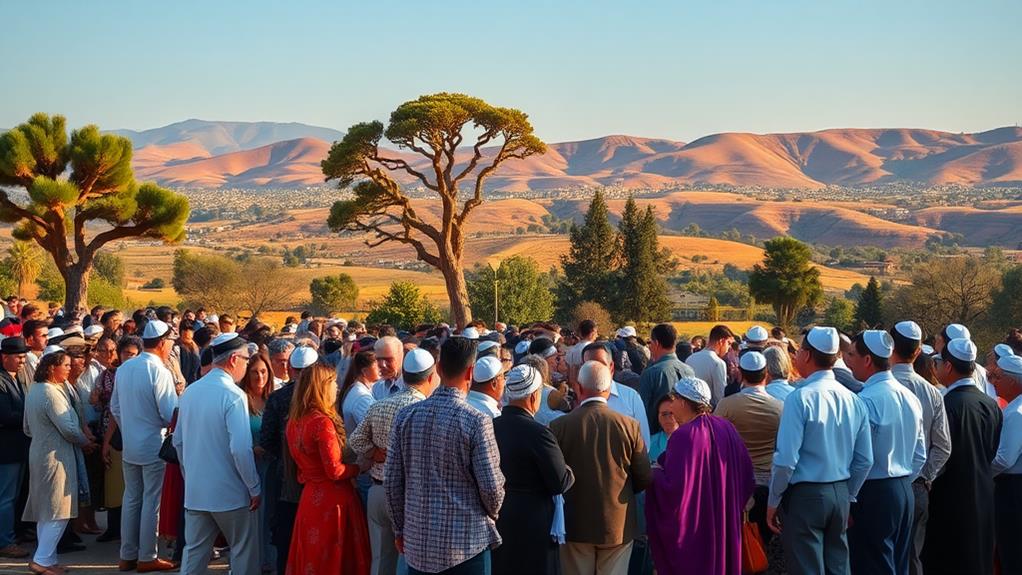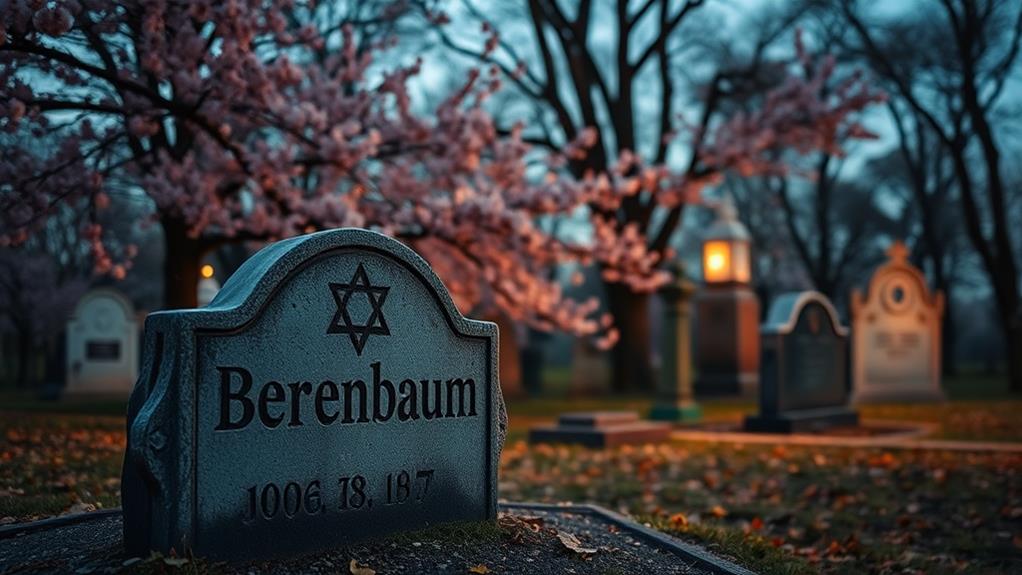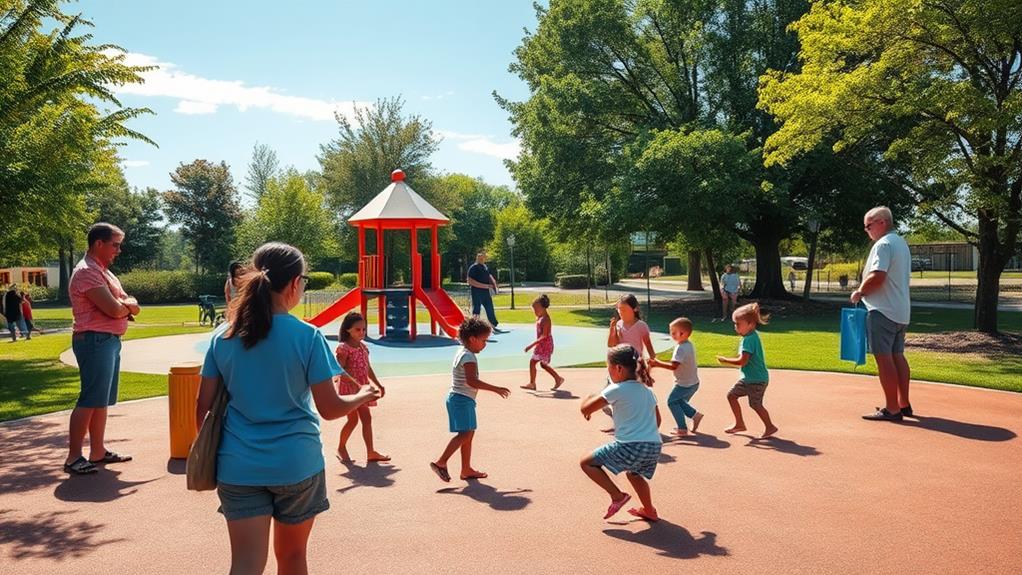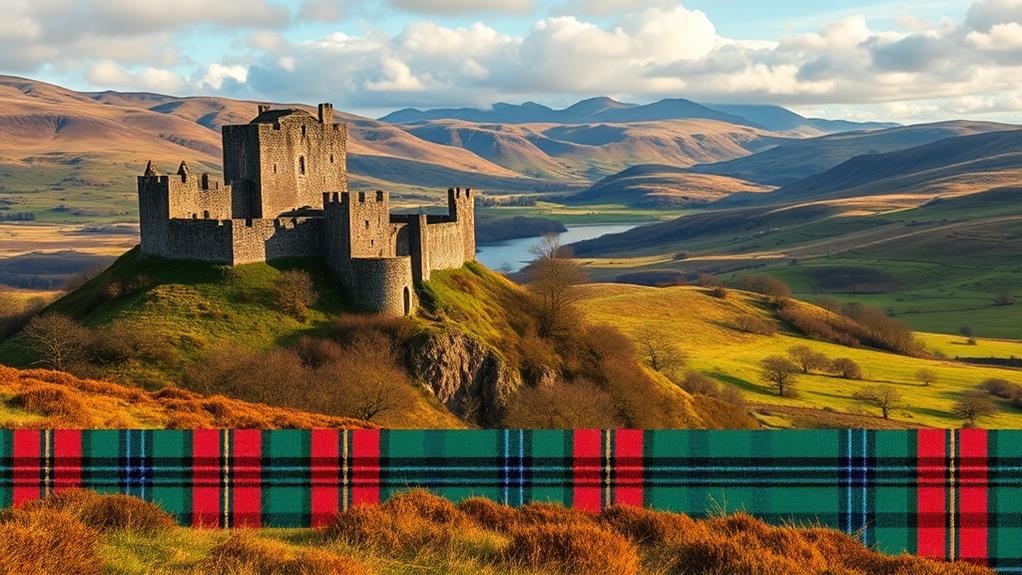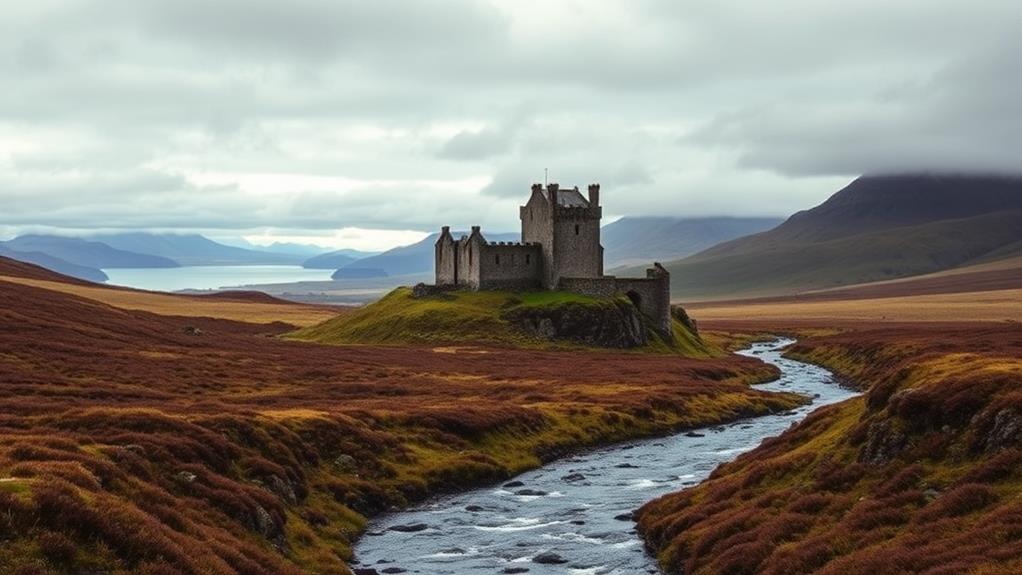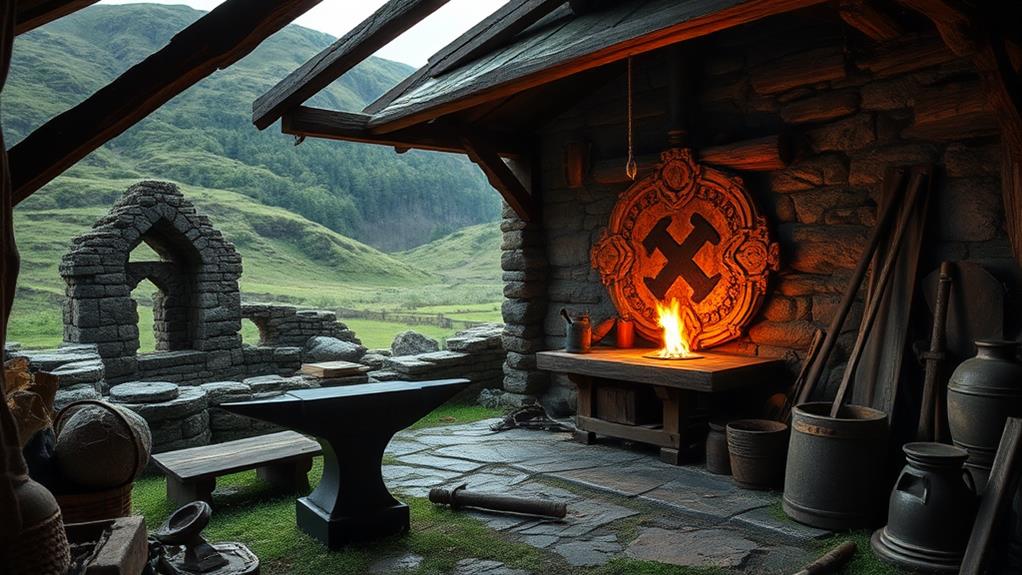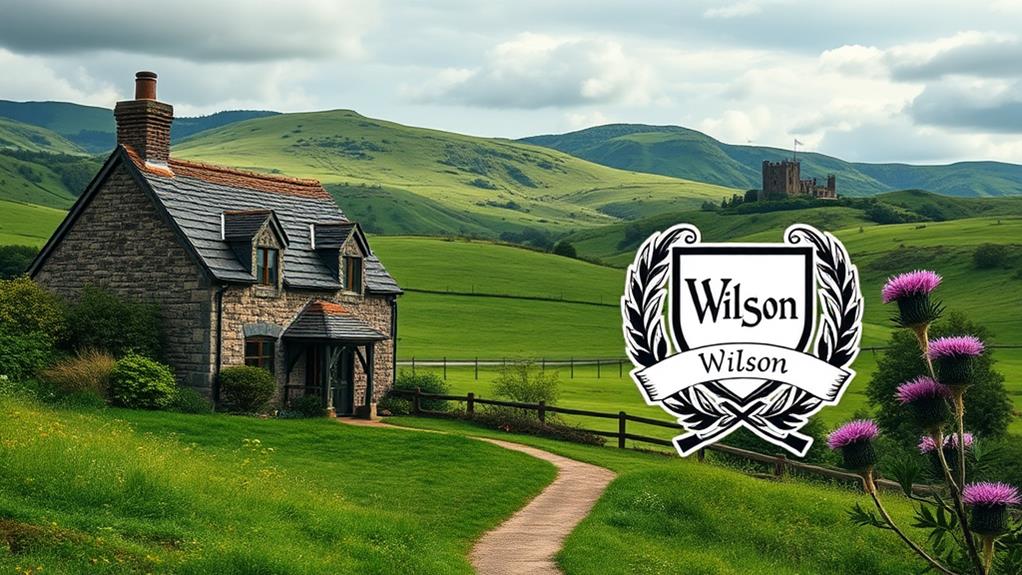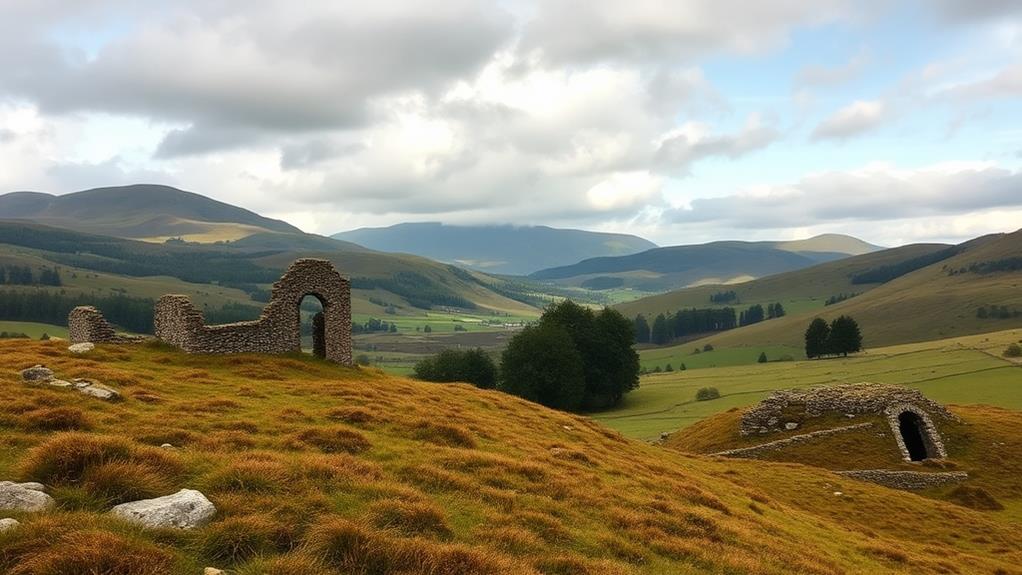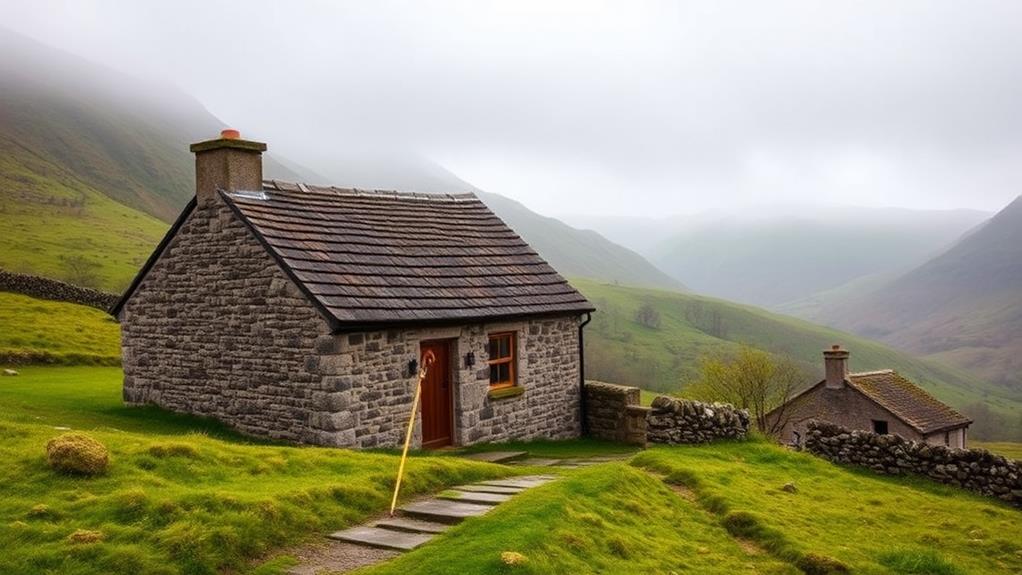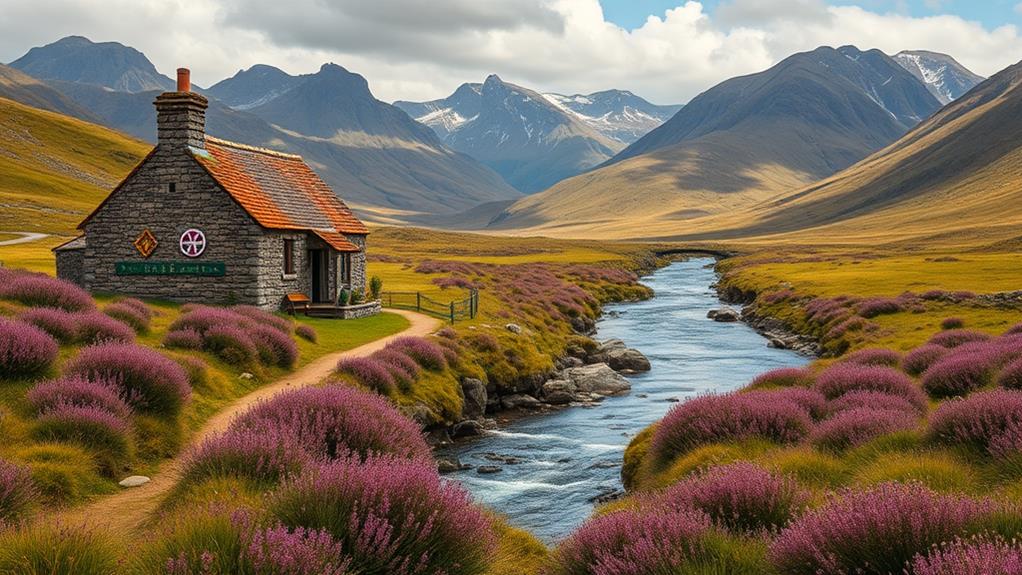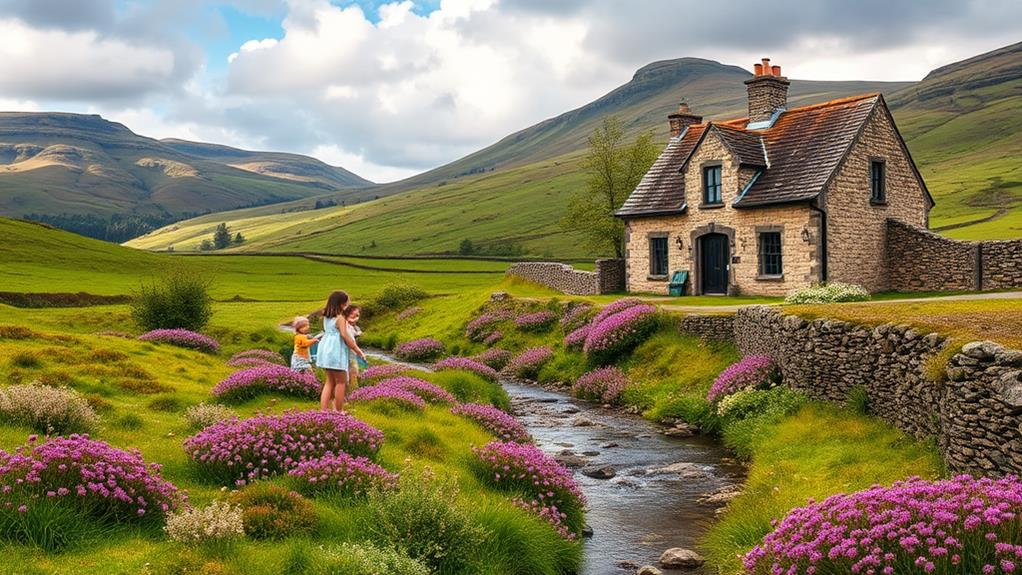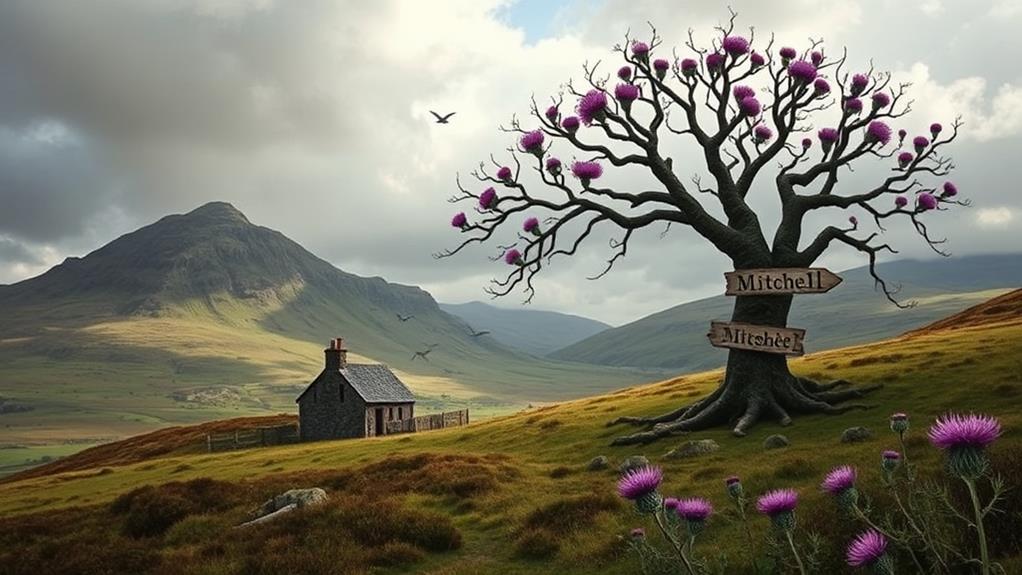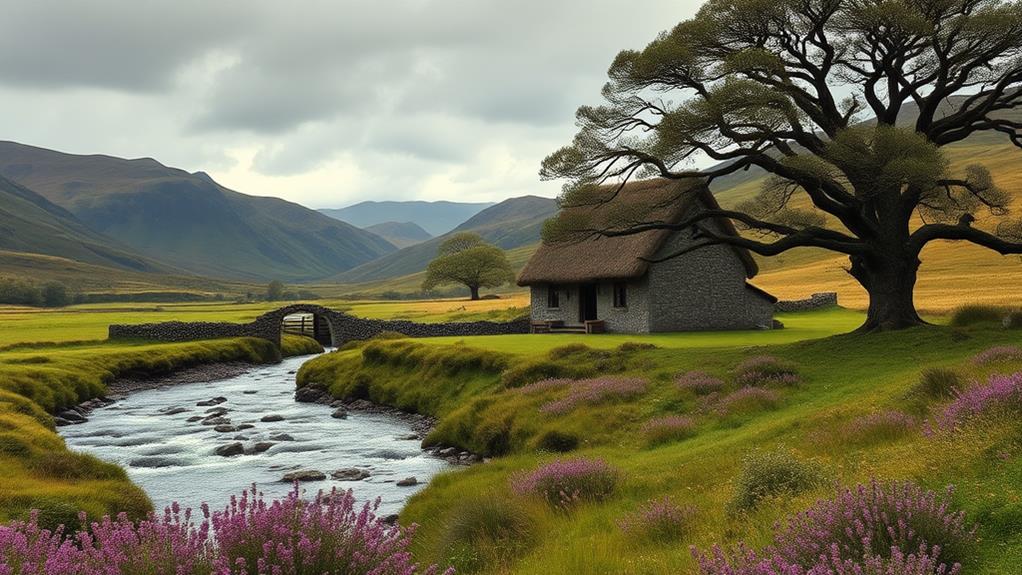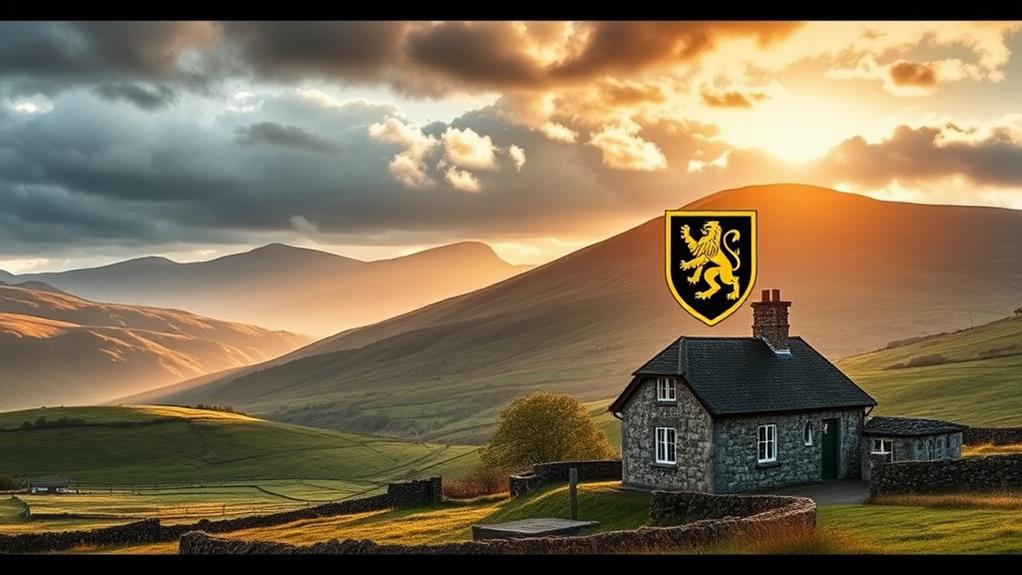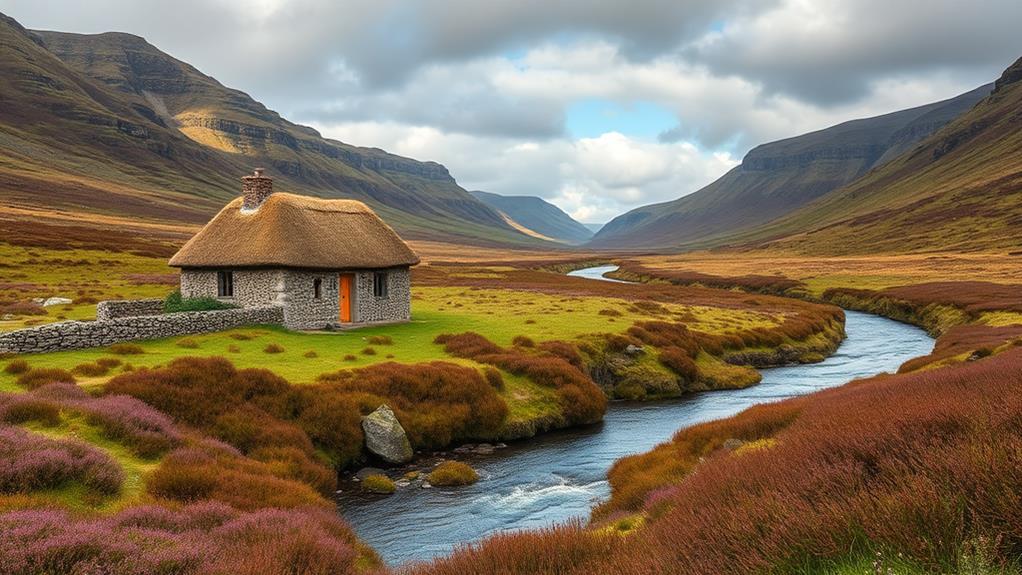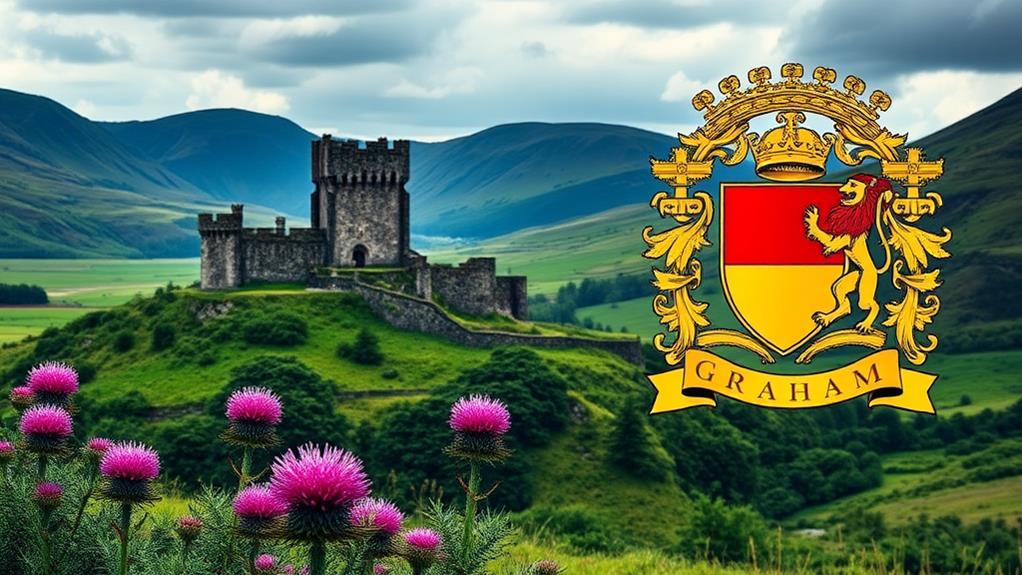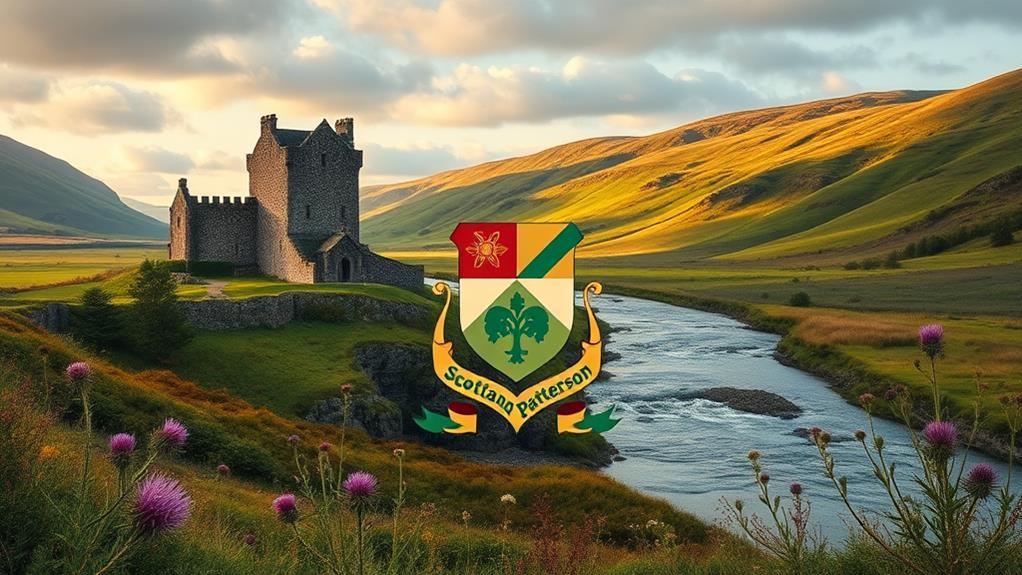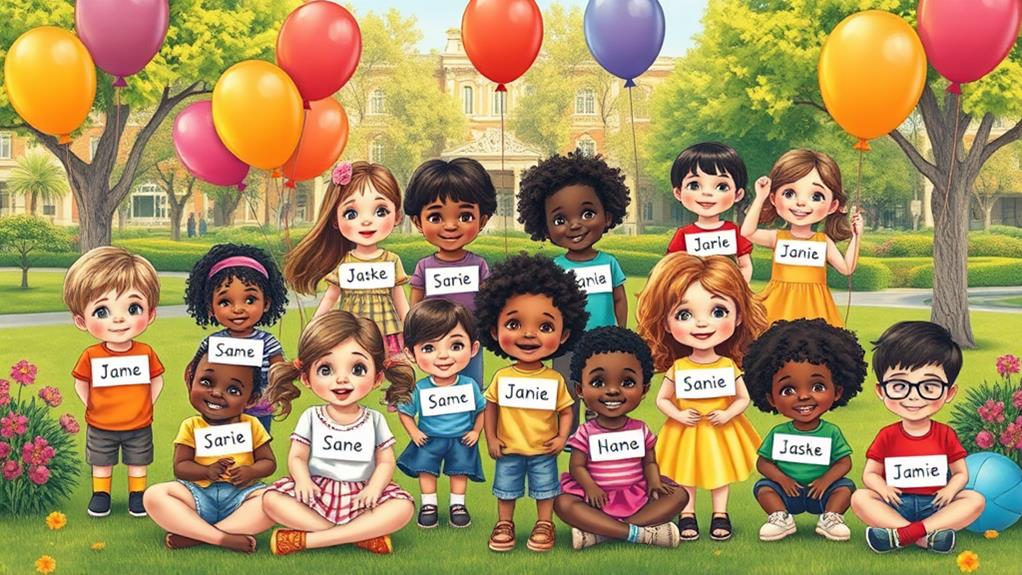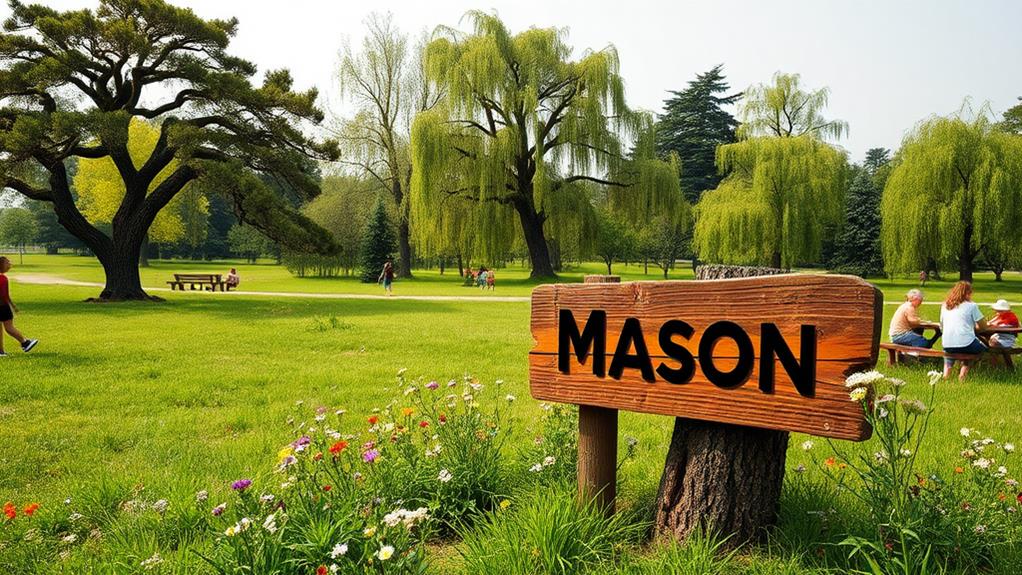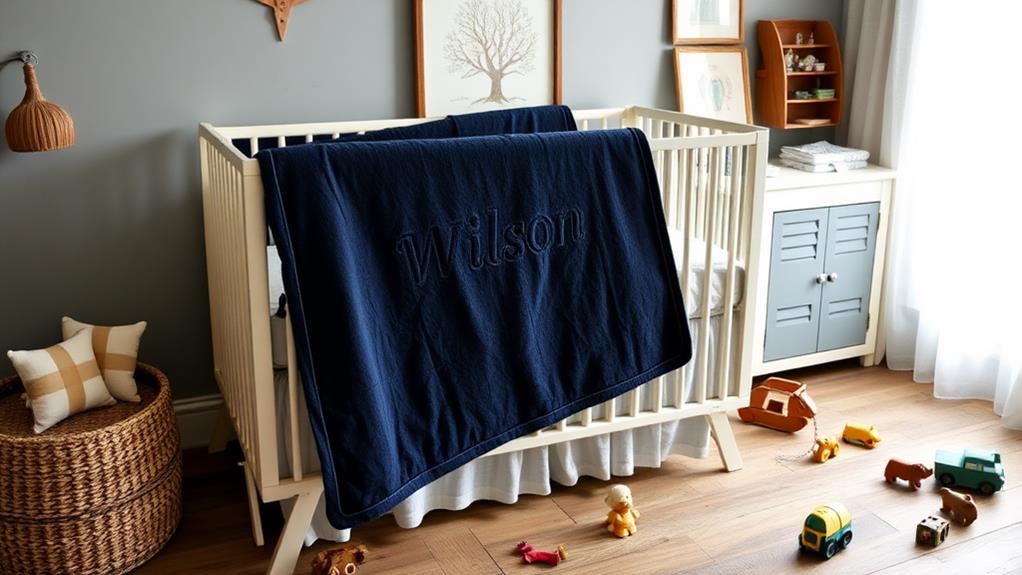When you think about Scottish surnames, you might immediately picture the rich tapestry of history they represent. Names like MacDonald and Campbell not only signify clan loyalty but also embody tales of valor and heritage. You'll find that each surname offers a glimpse into the past, revealing connections to occupations, lineage, and even geographic origins. As you explore these popular names, you'll uncover fascinating stories and insights that might just surprise you. What hidden meanings and legacies do these surnames carry, and how might they resonate with your own history?
MacDonald
You'll find that the MacDonald clan played a significant role in Scottish history, especially during the medieval period. They were known for their loyalty and bravery, often leading battles against rival clans.
As you explore the stories of the MacDonalds, you'll discover tales of chieftains who fought valiantly to protect their land and people.
Today, the MacDonald name continues to thrive, not just in Scotland but all around the world. Many people with this surname proudly celebrate their heritage, often gathering for clan events and reunions.
If you're connected to this name, you're part of a legacy that values courage and community. So, embrace your connection to the MacDonald clan, and let its rich history inspire you!
Campbell
The Campbell clan, renowned for its influential role in Scottish history, has roots that trace back to the 13th century. You might find it fascinating that the name "Campbell" is believed to derive from the Gaelic "Caimbeul," which translates to "crooked mouth." This name likely referred to a physical characteristic of an early clan member.
Throughout the centuries, the Campbells have held significant power, especially in the Highlands, where they played crucial roles in various conflicts and alliances.
One of the most famous Campbells was Sir Colin Campbell, known for his leadership during the Wars of Scottish Independence. The clan's motto, "Ne Obliviscaris," meaning "Forget Not," reflects their commitment to loyalty and remembrance.
As you explore the history of the Campbells, you'll discover that they were often embroiled in rivalries, especially with the MacDonalds, making their story even more intriguing.
Today, the Campbell clan continues to celebrate its rich heritage, organizing gatherings and events where members reconnect with their roots. If you have Campbell ancestry, you can take pride in being part of a family with such a dynamic legacy in Scotland's history.
Smith
Smith is one of the most common surnames in Scotland and has fascinating roots that date back to the early Middle Ages. You might be surprised to learn that the name originally referred to someone who worked with metal, like a blacksmith. In those times, blacksmiths were essential to communities, crafting tools, weapons, and horseshoes. This profession was so important that it became a popular surname, reflecting the skills and trades of the people.
As you explore Scottish history, you'll notice that the name Smith appears throughout various regions, showing its widespread use. In fact, it's not just a Scottish surname; it's found in many cultures around the world, often with similar meanings related to metalwork.
In Scotland, many Smiths can trace their ancestry back to specific clans or areas, adding a unique twist to their family history. If you've got the surname Smith, you're part of a long tradition that connects you to these hardworking craftsmen.
Brown
Tracing the origins of the surname Brown reveals a rich tapestry of history that dates back to medieval Scotland. This surname, often associated with a color, likely referred to someone with brown hair or a darker complexion. In many cases, it served as a nickname, capturing a person's physical traits.
You might find it fascinating that Brown is one of Scotland's most common surnames, with roots in Gaelic and Old English. Over time, it spread across the country, evolving into various spellings and forms.
Families with this surname played vital roles in Scotland's history, contributing to both local communities and national events.
As you explore your own ancestry, you may discover connections to the Brown lineage. The name isn't just a label; it reflects a legacy of resilience and adaptability.
Throughout centuries, individuals with the surname Brown have made their mark in various fields, from politics to the arts.
Wilson
Exploring the origins of the surname Wilson uncovers a fascinating lineage tied to the medieval Scottish patronymic tradition. The name Wilson actually means "son of Will," with Will being a diminutive of William. You might find it interesting that William itself comes from the Old German name Wilhelm, which means "resolute protector." This connection highlights how surnames often reflect family ties and heritage.
In Scotland, surnames like Wilson emerged during the 12th century, as families began adopting last names to distinguish themselves. You'll notice that Wilson is quite common, ranking among the top surnames in Scotland. It's a testament to its widespread use and the influence of families bearing this name throughout history.
As you dig deeper into the Wilson lineage, you may discover various branches spread across the globe, especially in places like the United States, Canada, and Australia. Each branch tells its own story of migration and adaptation.
Whether you're tracing your ancestry or just curious about names, the story of Wilson is rich with historical significance, connecting you to a lineage that has thrived for centuries.
Taylor
The surname Taylor has a rich history rooted in the medieval occupation of tailoring, a craft that was essential in society. If you've got the surname Taylor, you're part of a long tradition that dates back to the 13th century. Tailors played a vital role in communities, creating clothing for everyone from common folk to nobility.
The name itself comes from the French word "tailleur," meaning "to cut," which reflects the skill involved in making garments.
As societies evolved, so did the significance of the Taylor name. It became associated with craftsmanship and style. In Scotland, many Taylors are believed to have originated from various regions, each contributing their unique flair to tailoring.
Over time, the surname spread across the globe, carried by those seeking new opportunities.
Today, having the surname Taylor often connects you to a legacy of creativity and craftsmanship. You might find Taylors in various professions, but that historical link to tailoring remains strong.
Anderson
Anderson is a surname that carries a strong legacy, originating from the patronymic practice of naming children after their fathers. In this case, "Anderson" means "son of Andrew." Andrew itself is derived from the Greek name Andreas, which means "manly" or "brave." This connection highlights the importance of lineage and family ties in Scottish culture.
If your last name is Anderson, you're part of a rich history that dates back centuries. The surname is particularly prevalent in Scotland, but you can also find it in other countries, especially where Scottish settlers have made their homes.
As you trace the roots of this name, you might discover fascinating stories of ancestors who lived in various regions of Scotland, such as the Highlands or Lowlands.
Anderson has also evolved into a common surname in many English-speaking countries. You might meet people with this name in the United States, Canada, or Australia.
Understanding the origins of Anderson helps you appreciate the heritage behind your name, and it connects you to a lineage that emphasizes strength and courage.
Clark
Many people with the surname Clark trace their ancestry back to a rich tapestry of Scottish history. The name itself comes from the Old English word "clerc," meaning a cleric or scribe. In medieval times, many clerics were educated men who held important positions in churches and communities, making this surname quite distinguished.
As you delve into your family history, you might discover that Clarks played significant roles in various localities across Scotland. The surname is particularly prevalent in the Borders region, where it often appeared in historical records. You may even find that your ancestors were landowners or participated in local governance.
The Clark family often embraced their roles as leaders and educators, contributing to their communities in meaningful ways. Over the centuries, many Clarks have migrated around the world, carrying their heritage with them.
Walker
Just as the Clark surname reflects a rich history tied to education and leadership, the name Walker carries its own significance in Scottish heritage. Originating from the Old English word "wealcere," which means "to walk," this surname traditionally referred to a fuller—someone who cleansed and thickened woolen cloth.
In the medieval period, Walkers played a crucial role in the textile industry, ensuring that garments were durable and of high quality.
As you explore the history of the Walker surname, you'll find it connects deeply to Scotland's economic development. Many Walkers were skilled craftsmen, contributing to local economies through their trade. The name is quite prevalent in Scotland, and you might even encounter several variations, such as Walkers, Walcher, or Waller.
Interestingly, the Walker surname has also made its way into popular culture, appearing in literature and various media. If you have the surname Walker, you're part of a legacy that showcases resilience and craftsmanship.
Embracing this heritage can give you a sense of pride, knowing that your ancestors contributed significantly to their communities.
Thompson
Tracing its roots back to the Old English personal name "Tom," the Thompson surname signifies "son of Thomas." This name, derived from the Hebrew name "Te'oma," meaning "twin," became popular in Scotland as families sought to honor their heritage.
You might be surprised to learn that the Thompson surname is one of the most common in Scotland, and it has a rich history.
As you explore this surname, you'll find that Thompsons have made their mark in various fields, from arts to politics. Many Thompsons have roots in the Borders region of Scotland, where the name was often associated with strong, resilient families.
Since naming practices have changed over the centuries, you might notice variations like Thomson or Tomson, but they all share that same connection to Thomas.
If you have the Thompson surname, you're part of a legacy that stretches back through generations. You may even find that your family history is interwoven with stories of bravery and tradition.
Understanding your surname can deepen your appreciation for your heritage, so take the time to explore the stories and connections that come with being a Thompson.
Scott
The surname Scott has a fascinating origin, rooted in the Old English word "scott," which means "a Scot" or "a person from Scotland." This name often indicated a geographical connection, as individuals with the surname likely hailed from the Scottish Highlands or Borders.
You might find it interesting that the name has been in use since the medieval period, making it quite historical.
As you explore the lineage of the Scott surname, you'll discover it's commonly associated with clans and families in Scotland. Many Scots took pride in their heritage, and the name became a badge of identity.
It's also worth noting that various spellings of Scott have appeared throughout history, including "Scot" and "Scotte," reflecting the evolution of language over time.
If you're tracing your own ancestry, a connection to the Scott surname could suggest a rich Scottish heritage.
Today, the name is widespread, not just in Scotland but also in many countries around the world.
Hall
While exploring Scottish surnames, you might come across Hall, which has its own intriguing history. The surname Hall is derived from the Middle English word "hal," meaning a large house or mansion. In Scotland, it often indicated someone who lived near or worked in a grand hall, perhaps as a servant or steward.
You'll find that the Hall name is quite common in various regions, especially in the Lowlands. Many families with this surname can trace their ancestry back to the medieval period when landowners often used titles related to their estates.
The Hall name also has notable connections to several clans and families throughout Scotland. It's interesting to note that the Hall surname isn't just Scottish; it has roots in England, as well. This shared heritage can sometimes create fascinating connections between families across borders.
As you delve deeper into your family history, you might discover that your own roots could be connected to the Hall lineage. Whether you're exploring historical records or engaging with family stories, the Hall surname offers a glimpse into a rich tapestry of Scottish culture and history.
Young
If you've come across the surname Young in your genealogical research, you're looking at a name with a rich background. The surname Young has Scottish origins, deriving from the Middle English word "yunge," which means "young" or "youthful." This name often indicated a younger person or the son of someone with a similar name.
It's fascinating how surnames can reflect personal characteristics or family relationships!
The Young family name has been recorded in various Scottish regions, particularly in the Borders and East Lothian. If you trace your ancestry back, you might uncover connections to notable figures, as the Youngs have played roles in Scottish history, including the church and local governance.
Many variations of the name exist, like Yong and Yung, reflecting the different dialects and languages spoken throughout Scotland.
Today, you might find the name Young not just in Scotland but across the globe, as Scottish emigrants took their names with them.
King
King is a surname that carries a sense of authority and nobility, reflecting its origins in the Old English word "cyning," which means "king" or "ruler." This name was often given to individuals who held positions of power or were associated with royalty in some way.
When you hear the name King, you might think of strength and leadership, and you're not wrong.
In Scotland, the King surname has a rich and varied history. It's often linked to noble families and has been borne by many prominent figures throughout the centuries.
If your last name is King, you could be part of a long lineage that once played a significant role in the region's governance and society.
Many Kings were landowners or warriors, and they contributed to the community in various ways.
The surname also spread beyond Scotland, finding its way into other cultures and countries, which adds to its fascinating story.
Mitchell
Tracing its roots back to the Old French name "Michel," the surname Mitchell has a rich heritage that reflects both strength and resilience. This name, which means "who is like God," became popular in Scotland during the medieval period.
You might find it interesting that Mitchell is often associated with the biblical figure Michael, the archangel known for his courage and leadership.
As you explore the history of the Mitchell surname, you'll discover that it spread across Scotland, especially in areas like the Highlands and Lowlands. Families with this surname contributed to various aspects of Scottish life, from agriculture to the arts.
In fact, many notable Mitchells have emerged over the years, including politicians, artists, and scholars, each leaving their mark on society.
If you carry the surname Mitchell, you can take pride in its strong roots and the legacy it holds. Today, the name continues to thrive, with many people around the world proudly identifying as Mitchells.
This enduring connection to history makes the name special, reminding you of the strength and resilience that your ancestors displayed throughout the ages.
White
The surname White has a fascinating history that dates back to ancient times, deriving from the Old English word "hwita," meaning "white" or "fair." This name likely started as a nickname for someone with pale skin or hair, reflecting the physical characteristics of individuals in medieval England.
Over the years, it transformed into a popular surname throughout Scotland and other regions. As you explore the origins of the name, you'll discover that it has various spellings, such as Wight and Whyte, each with its own unique history.
In Scotland, the surname White often appears in historical records, suggesting its widespread use among different clans and families. This name also has connections to other cultures, making it a fascinating study for genealogists and history buffs alike.
Today, people with the surname White can be found all over the world. They often take pride in their heritage, learning about the stories behind their name.
If you're interested in tracing your own family history, you might find that the journey leads you through fascinating tales and connections to the past. So, dive in and uncover the legacy of the White surname!
Harris
Originating from both the Old English name "Harry" and the Gaelic "O' hEireamhóin," the surname Harris carries a rich heritage that reflects its dual roots in both English and Scottish cultures.
This surname has a fascinating history, often associated with nobility and land ownership in medieval times. If your last name is Harris, you're part of a lineage that evokes stories from centuries past.
Harris isn't just a name; it embodies a sense of identity and belonging. Over the years, many individuals with this surname have made significant contributions to society in various fields, from literature to politics.
You'll find that Harris is quite popular in Scotland, where it has deep connections to local communities and traditions.
Interestingly, the name is also linked to certain geographical areas, including Harris Island in the Outer Hebrides. This connection to place adds another layer to the name's significance.
So, whether you're exploring your family tree or simply curious about the name, understanding its origins can deepen your appreciation for your heritage.
With each mention of Harris, you're celebrating a name that has stood the test of time!
Wood
Wood is a surname that evokes images of strength and nature, reflecting its roots in the Old English word "wudu," meaning forest or wood. This name often signifies a connection to the natural world, perhaps indicating ancestors who lived near or worked in woodlands.
If you bear this surname, you might feel a sense of pride in your family's history, as people with the last name Wood were traditionally known for their skills in timber and craftsmanship.
In Scotland, the Wood surname can be traced back to various regions, including the Highlands and Lowlands. The name has several variations, such as Wod and Wode, which highlight its longstanding presence in Scottish history.
You might find that your family name has deep ties to the land, symbolizing not just a connection to nature but also resilience and endurance.
As you explore your heritage, consider how the Wood surname reflects your family's story. Each branch of the family tree might reveal unique tales of survival and adaptation, showing how your ancestors thrived in their environments.
Embracing the Wood name can inspire a deeper appreciation for nature and your family's legacy.
Martin
Have you ever wondered about the story behind the surname Martin? This surname has deep roots in Scotland, tracing back to the Latin name "Martinus," which means "of Mars," the Roman god of war. It's a name that evokes strength and bravery, reflecting the qualities many families admired in their ancestors.
In Scotland, the Martin surname often appears in various spellings, such as Martyn or Martine. Families bearing this name have a rich history, with many believed to be descended from noble lineages or early settlers.
Throughout the centuries, Martins were known for their contributions to agriculture and trade, helping shape local communities.
You might find the name Martin in different regions of Scotland, especially in areas like Ayrshire and Lanarkshire. Each family carries its unique story, often tied to the land they lived on and the trades they pursued.
Today, the surname remains popular, linking many people to their Scottish heritage. So, if you're a Martin, you're part of a proud lineage that carries a legacy of resilience and determination.
It's fascinating how a name can connect you to a rich tapestry of history!
Stewart
Steeped in history and nobility, the surname Stewart is one of Scotland's most distinguished names. It traces its roots back to the medieval era, originating from the Old English word "stiweard," meaning steward or guardian. This name was often given to individuals who managed estates or important households.
You might find it interesting that the Stewarts rose to prominence in the 14th century. They were appointed as stewards of the Scottish royal household, playing key roles in the governance of the realm. Over time, the family's influence grew, and they eventually became Scottish kings, with Robert II being the first monarch from this lineage in 1371.
Today, the Stewart name is widely recognized, not just in Scotland but around the world. If you carry this surname, you're part of a legacy that includes noble heritage and a rich tapestry of Scottish history.
Many people with the surname have made significant contributions in various fields, from politics to the arts. So, whether you're exploring your family tree or simply curious about Scottish names, the Stewart surname offers a fascinating glimpse into Scotland's past.
Reid
Following in the footsteps of noble surnames like Stewart, the name Reid also boasts a rich history in Scotland. This surname, derived from the Old English word "read," meaning "red," often referred to someone's hair color or complexion. If you've got red hair or know someone who does, there's a chance they might be linked to this name!
Reid is a common surname across Scotland, and it has deep roots in various regions, including the Borders and the Highlands. Many families with this surname can trace their lineage back to the early Middle Ages, when names were often based on physical traits or occupations.
You might find Reids in historical records as landowners, farmers, or even soldiers.
Interestingly, the name has several variations, such as Reed and Read, which you might encounter in different parts of the world. This adaptability shows how the Reid family has spread far beyond Scotland, with descendants now living in places like North America and Australia.
Ross
The surname Ross has a fascinating history that traces back to its Gaelic roots, specifically from the word "ros," meaning "promontory" or "headland." This name often referred to those living near prominent geographical features, highlighting the strong connection between people and their land in Scotland.
When you think of the Ross surname, you might picture rugged coastlines or hills, places where your ancestors thrived.
The Ross clan, particularly influential in the Highlands, played a significant role in Scottish history. They were known for their bravery and loyalty, especially during the turbulent times of clan conflicts and the Jacobite uprisings.
If you have Scottish ancestry, you might find that the name Ross reflects a proud heritage of resilience and strength.
Many people with the surname Ross today can trace their lineage back to these remarkable clansmen. In modern Scotland, the name remains popular, and you'll often find it in various forms, such as Rossie or Ros.
Graham
With roots in the Old English and Norman languages, the surname Graham is often associated with the meaning "gravelly homestead." This name originally referred to those who lived near or owned land characterized by gravel or stone.
You might find it interesting that Graham has a rich history, dating back to the early medieval period in Scotland. As you explore this surname, you'll notice that it became prominent in the Scottish Borders, particularly in the 12th century.
The Grahams were known for their strong connections to both agriculture and military service, often serving as loyal warriors. The name has variations, including Graeme and Gram, each carrying its own unique flair.
If you're lucky enough to have the surname Graham, you share a legacy linked to a vibrant past. Many Grahams have made significant contributions in various fields, from politics to arts and sciences.
Cooper
In Scotland, the surname Cooper has a fascinating origin tied to craftsmanship, specifically the art of barrel-making. This trade was essential in the past, as barrels were crucial for storing and transporting goods like ale, wine, and even grains.
When you hear the name Cooper, think of skilled artisans who carefully crafted wooden barrels, using their hands and tools to create something valuable. The name itself comes from the Old English word "cūpere," meaning barrel-maker.
If you have this surname, you might find it interesting that your ancestors likely played an important role in local economies, especially in areas known for brewing or shipping.
As you explore your family history, you may discover that many Coopers settled in specific regions of Scotland, contributing to the local culture and industry. Some even moved to other countries, carrying their craft with them.
Today, the surname Cooper is still quite common in Scotland and beyond. So, whether you're raising a toast or enjoying a meal, remember the rich legacy behind your name, rooted in the skilled work of those who came before you.
Patterson
Tracing the roots of the surname Patterson reveals a strong connection to Scottish heritage, often linked to the name "Patrick." This surname typically signifies "son of Patrick," reflecting a common practice of surname formation in Scotland, where family lineage plays a crucial role.
If you have the surname Patterson, you likely share a lineage that goes back to the popular name Patrick, which means "noble" in Latin.
Patterson is a name that carries stories of generations past, as many bearers of this surname were once known for their farming skills or involvement in local trades. Families with the Patterson name can be found throughout Scotland, particularly in regions like Ayrshire and Lanarkshire.
It's fascinating to think about how your ancestors might've lived and worked in these areas, contributing to the communities around them.
As you explore your own family history, you might uncover unique tales linked to the Patterson name. Whether it's through records, stories passed down, or visits to Scotland, each piece of information enriches your understanding of the heritage that comes with being a Patterson.
Embrace this connection to your roots; it's a part of what makes you, you!

















